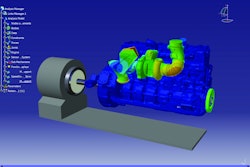The U.S. Environmental Protection Agency (EPA) has awarded more than $6.6 million in grants to eight universities in support of black carbon research. Black carbon is the sooty black material emitted from diesel-powered engines and vehicles, industries like brick kilns and coke ovens, traditional cookstoves, and other sources that burn fossil fuels or biomass. Black carbon can affect the climate in the near term, and like other types of fine particles, can cause serious health effects such as cardiovascular and respiratory ailments. Unlike greenhouse gases, which remain in the atmosphere for decades or centuries, black carbon particles only stay in the atmosphere for days or weeks. Therefore, reducing black carbon emissions could have a positive effect on our climate quickly.
"This research on black carbon will provide valuable information about the impact of black carbon on climate change," says William Sanders, director of EPA’s National Center for Environmental Research. “An increased understanding of the impact black carbon has on climate change will better protect people and the environment."
EPA’s Science to Achieve Results (STAR) program awarded nine grants to support research to study the role and effects of black carbon. The research will analyze the impacts of black carbon on air and water quality, investigate the behavior of black carbon aerosols in the atmosphere, and develop innovative tools such as computer models to look at black carbon deposits on snow. Black carbon deposited on snow and ice hastens melting by directly absorbing sunlight and by darkening the surface, which reduces the amount of light reflected back to space. The research also examines the aging of black carbon in the atmosphere.
Award recipients include the University of Illinois at Urbana-Champaign; Carnegie Mellon University; University of California, Irvine; University of California, Riverside; University of Iowa; University of Washington; University of Wisconsin-Madison; and Rutgers University.
More information on the black carbon research projects: www.epa.gov/ncer/blackcarbon

![Deutronic Dbl 1903 14[1]](https://img.oemoffhighway.com/files/base/acbm/ooh/image/2023/10/Deutronic___DBL_1903_14_1_.6528568875a4e.png?auto=format%2Ccompress&fit=crop&h=100&q=70&w=100)







![Deutronic Dbl 1903 14[1]](https://img.oemoffhighway.com/files/base/acbm/ooh/image/2023/10/Deutronic___DBL_1903_14_1_.6528568875a4e.png?ar=16%3A9&auto=format%2Ccompress&fit=crop&h=135&q=70&w=240)








